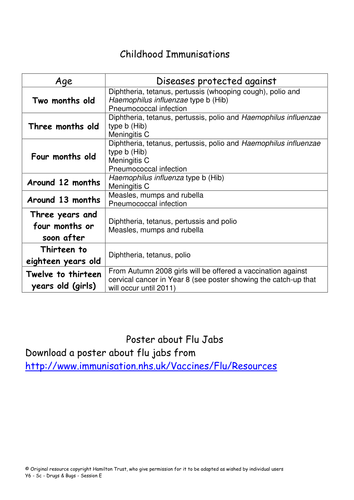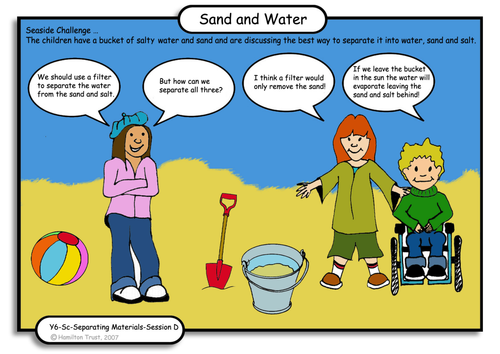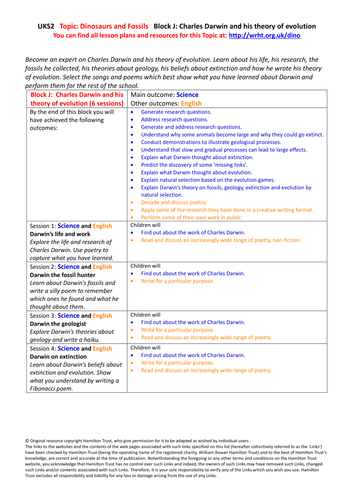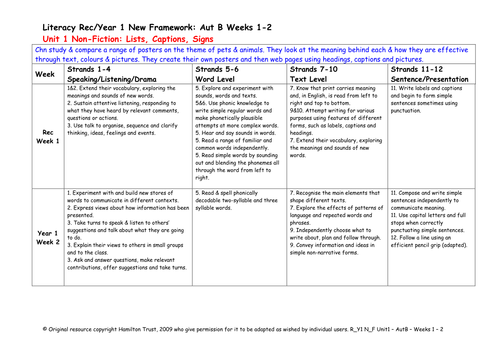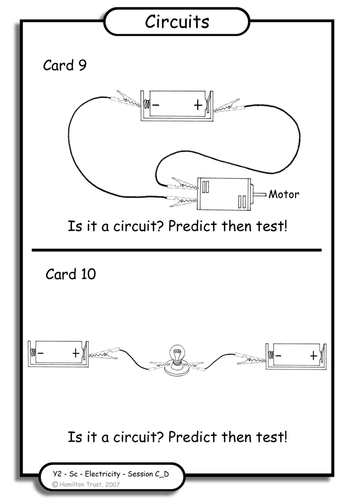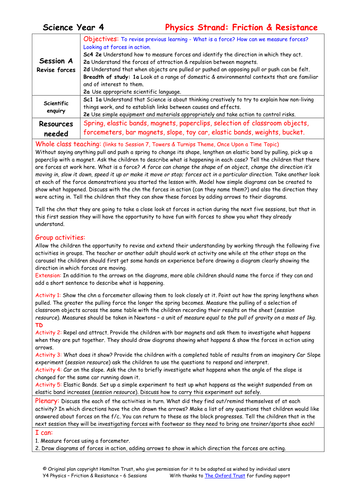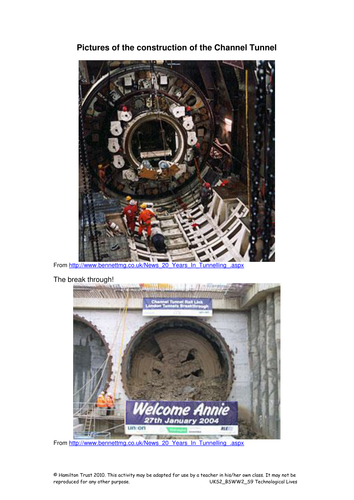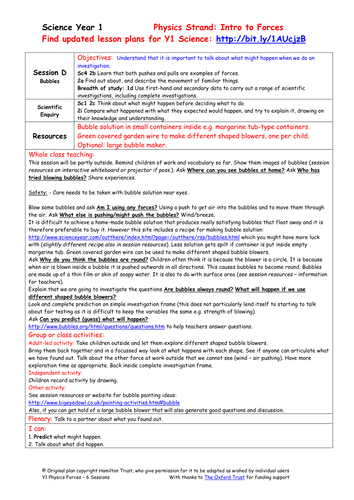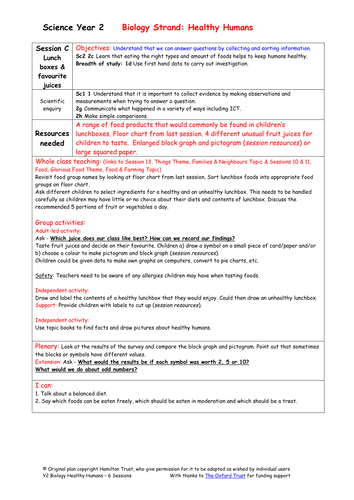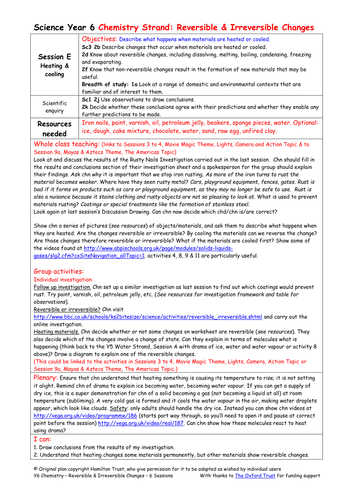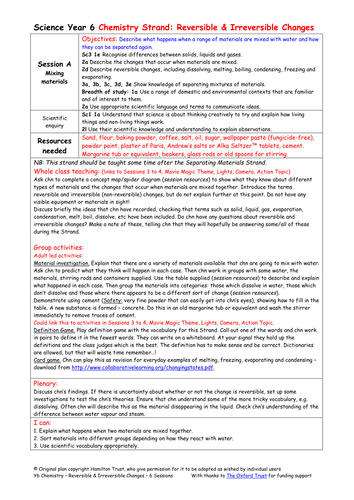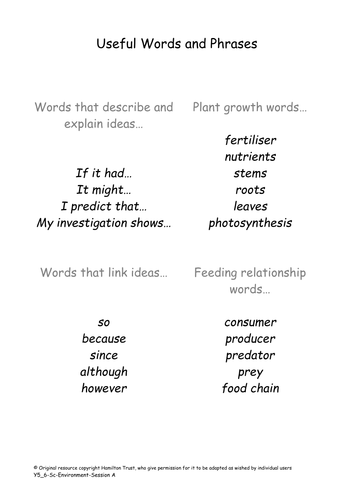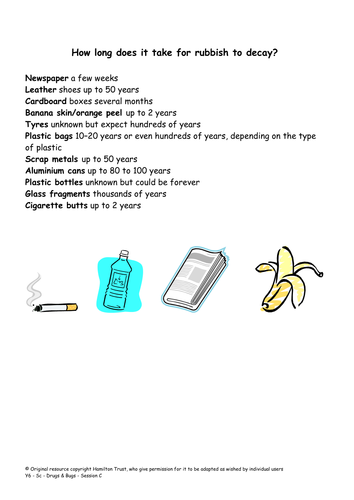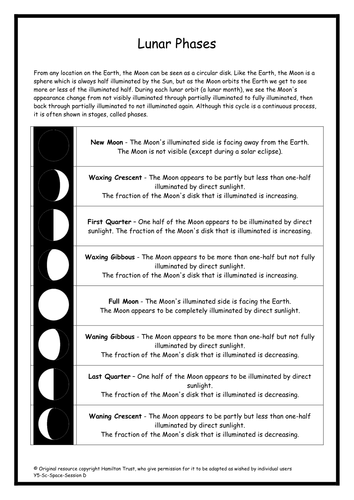
3k+Uploads
10009k+Views
11617k+Downloads
Primary science

Everyday Materials - Materials Matter - Year 2
Explore the useful properties of materials with a range of investigations involving absorbency and flexibility. Discover which type of kitchen towel or cloth is most effective at mopping up spills; consider why building materials must be absorbent and which ones fit the bill; create artwork by exploring the textures of materials and learn all about wax and how to re-mould it.
Includes 6 session plans & resources:
01 - Mopping up
02 - Are bricks absorbant?
03- Waterproofing materials
04 - Printing
05 - Resist the wax!
06 - Melting and moulding
Hamilton’s science scheme uses hands-on investigative science activities to promote a deep understanding of scientific concepts and help children develop effective methods of scientific enquiry. Our scheme is fresh, original and free!

Diseases and antibiotics
Look at diseases caused by micro-organisms. Invite a health professional into class for children to question. Discuss prevention and cure of illnesses caused by microbes including vaccination and antibiotics. Find out about the work of some famous scientists.
Suitable for Y6 pupils.

Animals, including humans - Excuse Me, Are These Your Teeth? - Year 4
Excuse me, are these your teeth? Who did this poo? Am I a predator?....Find the answers to these and other peculiar questions about digestion and food chains.
Includes 6 session plans & resources:
01 - Excuse me, are these your teeth?
02 - What happens to my food?
03 - What does the small intestine do?
04 - What did this poo?
05 - Who's the predator?
06 - Did you know...?
Hamilton’s science scheme provides children with a broad but comprehensive experience of primary science that systematically covers all of the National Curriculum for England objectives. Each year group is split into 6 blocks of 6 sessions, each of which can be completed within a half-term. We present them in a recommended teaching order, but you may adapt this to fit your requirements. Working scientifically, investigations and meaningful outcomes are fully incorporated in each block.
Find out more: www.hamilton-trust.org.uk/scites

Evaporation
Evaporation is the name of the game in this session as children use it to separate materials in solutions. They investigate a variety of liquids to see which leave a residue after evaporation and grow their own salt crystal. Suitable for Y6 pupils.

Energy
This session we consider how we are using up fossil fuels. How did we heat our homes and cook in the past? Discuss renewable energy and any local schemes to try and use more renewable energy. Challenge children to make a solar oven and cook something with it!

Seasonal changes - Wonderful Weather - Year 1
Think about what you already know about weather, look at weather forecasts and video your own school weather forecasts; do weather observations and make collages about the seasons; have fun with shadows; make a class weather station that can measure rainfall, wind direction and temperature.
Includes 6 session plans & resources
1 - What do we know about weather?
2 - Weather Watching
3 - Shadow fun
4 - Setting up a weather station: measuring rainfall
5 - Setting up a weather station: measuring wind direction
6 - Setting up a weather station: make a thermometer box
Suitable for Year 1 pupils.
Hamilton’s science scheme uses hands-on investigative science activities to promote a deep understanding of scientific concepts and help children develop effective methods of scientific enquiry. Our scheme is fresh, original and free!

Dinosaurs and Fossils - Charles Darwin and his theory of evolution - Upper Key Stage 2
Be a palaeontologist! Become an expert on Charles Darwin and his theory of evolution. Learn about his life, his research, the fossils he collected, his theories about geology, his beliefs about extinction and how he wrote his theory of evolution. Select the songs and poems which best show what you have learned about Darwin and perform them for the rest of the school.
Includes:
- Topic Overview
- Block Overview
- Lesson 01: Darwin's life and work
Explore the life and research of Charles Darwin. Use poetry to capture what you have learned.
- Lesson 02: Darwin the fossil hunter
Learn about Darwin’s fossils and write a silly poem to remember which ones he found and what he thought about them.
- Lesson 03: Darwin the geologist
Explore Darwin’s theories about geology and write a haiku.
- Lesson 04: Darwin on extinction
Learn about Darwin’s beliefs about extinction and evolution. Show what you understand by writing a Fibonacci poem.
- Lesson 05: Darwin and evolution
Explore how Darwin came up with his theory of evolution by natural selection and write a Horrible Histories style song.
- Lesson 06: Evolution performance
Select the songs and poems that best show what you have learned about Darwin. Practise and then perform them for the rest of the school.
Find more lesson plans and resources at www. hamilton-trust.org.uk.

Yr1 NF Unit 1 Lists, captions and signs
Children study and compare a range of posters on the theme of pets and animals. They look at the meaning behind each and how they are effective through text, colours and pictures. They create their own posters and then web pages using headings, captions and pictures.

Sound - Listen Up! - Year 4
The rock stars of the world need your help! They want their children to come to their concerts and rock-out, but they want to protect their precious ears! Find out all you can about sound; how it travels, pitch and volume. Then investigate materials to see which will provide the best insulation against sound. Be ready to present your ideas to a famous panel.
Includes 6 session plans & resources:
01 - Sound walk
02 - Good vibrations
03 - Pitch and volume
04 - Pardon?
05 - Ssssshhhhhh!
06 - The Rock Star Challenge
Hamilton’s science scheme uses hands-on investigative science activities to promote a deep understanding of scientific concepts and help children develop effective methods of scientific enquiry. Our scheme is fresh, original and free!

Simple circuits
Children discover for themselves how to make a simple circuit to light a bulb using a few basic components. Compare the circuits to a diagram of a simple circuit to see how they can be represented.
Suitable for Year 2 pupils.
Find other lesson plans and resources at www.hamilton-trust.org.uk.

Everyday materials - Let's Build - Year 1
Explore different materials and sort them into groups before writing songs based on their properties! Consider what it would be like if the tables were made of jelly or the chairs were chocolate! Then recreate the story of the three little pigs and predict what will happen to their houses.
Includes 6 session plans & resources
1 - What materials can we find?
2 - Matching materials
3 - Magnets and metal
4 - Sorting objects
5 - The three little pigs and their buildings
6 - The alternative three little pigs
Hamilton's brand new science scheme is now complete on our website. We have replaced the science planning materials with a completely new, and improved, set. The National Curriculum for England is now fully covered in regular 6-session blocks to fit into half-term slots. Find out more: www.hamilton-trust.org.uk/scites

Revise forces
It’s forces ‘n’ fun in this session as the children get the opportunity to show what they already know. Through hands on activity they use slopes, magnets and elastic bands to revise previous learning. Forcemeters at the ready! Suitable for Y4 pupils.

Crossing The Channel
Children discuss ways of crossing the Channel and then make a balloon-powered hovercraft.

Bubbles
Explore bubbles, the forces needed to make bubbles and the force that make bubbles round. Investigate the question: Are bubbles always round? What will happen if we use different shaped bubble blowers? Suitable for Year 1 pupils.
Find other lesson plans and resources at www.hamilton-trust.org.uk.

Lunch boxes and favourite juices
Children select ingredients for a healthy and an unhealthy lunchbox. Introduce the concept of 5 portions of fruit or veg per day.
Conduct a survey about favourite fruit juices and draw pictograms and block graphs. Draw and label healthy lunchboxes.
Suitable for Year 2 pupils.
Find other lesson plans and resources at www.hamilton-trust.org.uk.

Heating and cooling
Use findings from Rusty Nails Investigation to plan another test. Look at the changes that occur when common materials are heated, and then decide whether or not cooling will reverse the change. What happens if the materials are first cooled and then heated?
Suitable for Y6 pupils.

Mixing materials
Find out what children already know about materials and the changes that occur when they are mixed. Predict and investigate what happens when a variety of materials are mixed with water. (Re)introduce terms reversible and irreversible. Play a vocabulary game.
Suitable for Y6 pupils.

Plant growth
Children receive a letter requesting help from the Native Nursery. Children must design and set up experiments to find the best conditions for growing seeds. They will monitor progress and report their findings in Session F.
Suitable for Y5/6 pupils.

Food and micro-organisms
Look at micro-organisms that are beneficial to food production and the problems of food decay caused by micro-organisms. Study yeast growth and begin some decay investigations on damp bread and apples. Use yeast to make bread rolls and discuss food hygiene.
Suitable for Y6 pupils.

Moon phases
Children discover that the Moon isn’t made of cheese and find out why it appears to change shape in the night sky. They look at the lunar cycle and use the correct terms to describe the changes that occur.
Suitable for Year 5 pupils.
Hamilton’s science scheme uses hands-on investigative science activities to promote a deep understanding of scientific concepts and help children develop effective methods of scientific enquiry. Our scheme is fresh, original and free!


